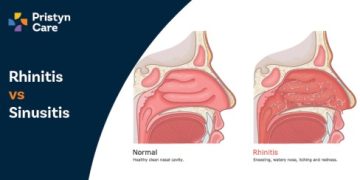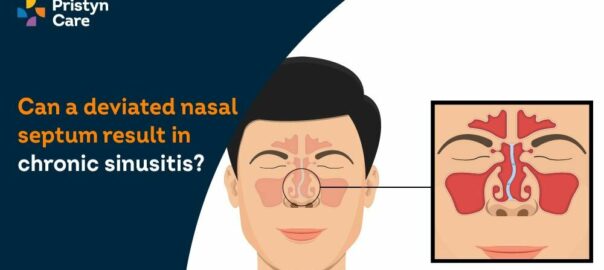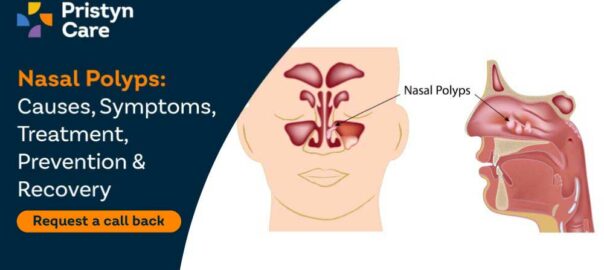![]() Views: 675
Views: 675
Rhinitis Vs Sinusitis
Struggling with a stuffy nose, sneezing, and headaches? You might be wondering whether it is rhinitis or sinusitis troubling you. These two conditions often cause confusion because their symptoms can be very similar, but understanding their differences is crucial for effective treatment.
Dedicated Support at Every Step!
Our Doctors are available 24 hours a day, 7 days a week to help you!
Rhinitis involves inflammation of the nasal mucous membrane, typically triggering sneezing and a runny nose. On the other hand, sinusitis affects the sinuses around the nasal passages and usually presents with pain, swelling, and a feeling of pressure along with blocked nasal passages.
In this blog, we will see the distinctive features, causes, and treatments for rhinitis and sinusitis. By identifying which of these issues is affecting you, you can seek the most appropriate relief and get back to feeling better faster.
Table of Contents
What is Rhinitis?
Rhinitis is a common condition marked by inflammation of the nasal mucous membrane. This inflammation leads to bothersome symptoms like a runny nose, sneezing, itching, and congestion. These symptoms can interfere with daily activities, making it important to understand the condition clearly.
There are two main types of rhinitis: allergic rhinitis and non-allergic rhinitis.
- Allergic Rhinitis: This type occurs when your immune system reacts to allergens in the environment. Common triggers include pollen, dust mites, pet dander, and mould. The body responds to these allergens by releasing histamines, which cause the symptoms of rhinitis.
- Non-Allergic Rhinitis: Unlike allergic rhinitis, this form does not involve the immune system. It can be triggered by various factors such as weather changes, smoke, strong odours, and certain medications. Symptoms are similar but are not caused by allergen exposure.
Causes and Risk Factors
Several factors can increase your risk of developing rhinitis. Here are the key ones:
- Genetics: A family history of rhinitis or other allergic conditions can raise your risk.
- Environment: Exposure to potential irritants or allergens, such as pollen or industrial pollution, is a significant factor.
- Weather: Changes in weather, especially cold or dry air, can trigger non-allergic rhinitis.
- Health Conditions: Certain health issues like hormonal changes, thyroid disorders, or chronic stress may predispose you to rhinitis.
- Lifestyle Factors: Smoking or exposure to second-hand smoke can exacerbate or trigger symptoms of rhinitis.
No Cost EMI, Hassle-free Insurance Approval
What is Sinusitis?
Sinusitis is the inflammation of the sinuses, the air-filled spaces within the bones around the nose. This condition leads to swelling and a build-up of mucus, causing blocked nasal passages. Symptoms typically include a stuffy or runny nose, facial pain or pressure, headache, and a reduced sense of smell and taste. Some people may also experience fatigue or a fever.
Sinusitis can be classified into two types: acute and chronic.
- Acute Sinusitis: This type often starts as a cold and then turns into a bacterial infection. Symptoms last for a short period, usually not more than a few weeks, but are quite intense.
- Chronic Sinusitis: Symptoms last for 12 weeks or longer and may not be as severe as in acute cases. However, they persist and can significantly affect one's quality of life.
Causes and Risk Factors
The causes of sinusitis vary depending on whether it is acute or chronic:
- Infections: Most cases of acute sinusitis are caused by a viral infection, but it can also develop from bacterial or fungal infections.
- Nasal Polyps: These tissue growths can block the nasal passages or sinuses.
- Deviated Nasal Septum: A crooked septum—the wall between the nostrils—may restrict or block sinus passages.
- Allergies: Allergic reactions can cause sinus passages to swell, blocking mucus drainage.
- Respiratory Tract Infections: Infections in the respiratory tract can inflame and thicken the sinus membrane, blocking mucus drainage.
Risk factors for developing sinusitis include previous respiratory tract infections, allergies, exposure to pollutants, smoking, and a weakened immune system. Managing these factors can help reduce the frequency and severity of sinusitis episodes.
Comparing Rhinitis and Sinusitis
Rhinitis and sinusitis are two prevalent nasal disorders that often confuse individuals due to their similar symptoms. However, understanding their similarities and differences is crucial for effective management and treatment.
Similarities Between Rhinitis and Sinusitis
Both conditions involve inflammation of the nasal passages and share several symptoms that affect the respiratory system. Here's a closer look:
- Nasal Congestion: Both conditions can lead to a blocked nose, which can interfere with breathing and sleep.
- Facial Pain or Pressure: Inflammation and congestion can cause discomfort around the face, especially under the eyes and at the bridge of the nose.
- Reduction in Sense of Smell: Swelling in the nasal passages can impair the sense of smell, a common issue in both ailments.
- Trigger Factors: Environmental allergens such as pollen, dust mites, and pet dander can exacerbate both rhinitis and sinusitis. Changes in weather and exposure to pollutants are also common triggers.
- Impact on Quality of Life: Chronic episodes of either condition can lead to significant discomfort, affecting daily activities and sleep patterns.
Key Differences: Symptoms and Causes
While rhinitis and sinusitis may appear similar, they are distinct in their manifestations and underlying causes.
- Symptoms:
- Rhinitis: Characterised primarily by sneezing, itchy nose, and a runny nose with clear mucus. These symptoms are more related to the nasal passages than the sinuses.
- Sinusitis: Distinguished by persistent thick, coloured nasal discharge, severe sinus headaches, and sometimes a fever—symptoms that point to infection or prolonged blockage in the sinus cavities.
- Causes:
- Rhinitis:
- Allergic Rhinitis: This is an immune response to environmental allergens. The body releases histamine and other chemicals that cause nasal inflammation and symptoms.
- Non-Allergic Rhinitis: Triggered by non-allergic factors such as irritants in the air, temperature changes, or food. It is not caused by the immune system reacting to allergens.
- Sinusitis: This can develop from an unresolved rhinitis, leading to infection. It is often triggered by prolonged nasal congestion that impedes sinus drainage, creating an environment conducive to bacterial growth. Structural issues like a deviated septum or nasal polyps can also cause sinusitis by blocking sinus drainage.
- Rhinitis:
Diagnosis
Diagnosing rhinitis and sinusitis involves specific techniques that help differentiate between the two conditions and establish the most effective treatment plan. Understanding when to seek medical advice is also crucial in managing these conditions effectively.
Diagnostic Techniques for Rhinitis
Diagnosing rhinitis primarily involves identifying the type—whether allergic or non-allergic. Here are detailed steps:
- Medical History: A detailed discussion about symptoms, their duration, and any seasonal patterns helps pinpoint the type of rhinitis.
- Physical Examination: The doctor examines the nose to check for signs of inflammation and possible polyps.
- Allergy Testing: If allergic rhinitis is suspected, skin prick tests or blood tests can determine specific allergens responsible.
- Nasal Endoscopy: In some cases, a thin, flexible tube with a camera is inserted into the nasal passages to view the area in detail, helping to rule out other conditions.
- Exclusion of Other Causes: Conditions like hormonal imbalances, medication effects, and other allergies must be ruled out through further medical evaluations.
Diagnostic Techniques for Sinusitis
Sinusitis diagnosis involves not just determining the presence of the condition but also its nature—acute or chronic. Here’s how it is diagnosed:
- Physical Examination: The doctor will check for tenderness in the nose and face and swollen nasal tissues.
- Nasal Endoscopy: Similar to rhinitis, this allows the doctor to see inside the sinuses to assess any blockages or inflammation directly.
- Imaging Tests: CT or MRI scans may be required to view the sinuses in more detail, especially in chronic cases, to check for deep inflammation or physical obstructions like polyps.
- Sinus Culture: In cases of chronic or recurring sinusitis, a sample from the sinus may be taken to determine the type of infection, which helps in selecting the appropriate antibiotics.
When to See a Doctor?
Knowing when to consult a healthcare professional can lead to quicker diagnosis and treatment, enhancing the quality of life. Here are some guidelines:
- Persistent Symptoms: If nasal congestion, sinus pain, or rhinitis symptoms last more than a week, it’s advisable to see a doctor.
- Severe Symptoms: High fever, nasal discharge that is unusual in colour or consistency, or vision problems are signs that require immediate medical attention.
- Recurring Episodes: Frequent bouts of symptoms or a feeling that previous treatments have not been effective should prompt a visit to the doctor.
- Impact on Quality of Life: If symptoms interfere significantly with daily activities, sleep, or work, professional advice should be sought to manage the condition effectively.
Treatment Options
Effectively managing rhinitis and sinusitis involves a combination of medications, lifestyle adjustments, and home remedies. In more severe cases of sinusitis, surgical options may be considered.
Treatment for Rhinitis
The treatment approach for rhinitis depends on whether it is allergic or non-allergic. Here's a detailed look:
- Medications:
- Antihistamines: These reduce sneezing, itching, and runny nose by blocking histamine in the body.
- Nasal Corticosteroids: These sprays help reduce nasal inflammation and are often considered the most effective treatment for allergic rhinitis.
- Decongestants: Available as pills or nasal sprays, they relieve nasal stuffiness but should not be used for more than a few days to avoid rebound effects.
- Leukotriene Receptor Antagonists: These are sometimes prescribed to help control allergy symptoms.
- Home Remedies:
- Saline Nasal Sprays: These can help rinse away allergens and irritants and soothe the nasal passages.
- Steam Inhalation: Breathing in steam can moisten the nasal passages and relieve nasal congestion.
- Lifestyle Changes:
- Avoiding Allergens: If allergic rhinitis is diagnosed, identifying and avoiding allergens is key.
- Maintaining Clean Air in the Home: Using air purifiers and regularly changing air filters can help reduce exposure to allergens.
- Staying Hydrated: Drinking plenty of fluids keeps the mucus thin and more manageable.
Treatment for Sinusitis
The treatment for sinusitis can vary depending on the acuteness and severity of the condition:
- Medications:
- Antibiotics: If sinusitis is caused by a bacterial infection, antibiotics might be prescribed to eliminate the infection.
- Nasal Corticosteroid Sprays: These can help reduce inflammation in the sinuses.
- Oral or Injected Corticosteroids: These are used for severe cases to relieve inflammation, especially when the nasal sprays are not effective.
- Surgical Options:
- Functional Endoscopic Sinus Surgery (FESS): This procedure is considered when sinusitis does not respond to medication. It involves removing obstructions that contribute to sinus drainage problems.
- Balloon Sinuplasty: A less invasive method that uses a balloon to widen the sinuses, allowing for better drainage and less frequent infections.
- Home Remedies:
- Nasal Irrigation: Using a saline solution to flush the sinuses can help clear out mucus and allergies.
- Warm Compresses: Applying warm compresses to the face can soothe sinus pains and relieve pressure.
Final Thoughts on Nasal Health
It's essential to distinguish between rhinitis and sinusitis to manage these conditions effectively. Although both can significantly disrupt daily activities, identifying their unique symptoms and causes allows for tailored treatment strategies.
For rhinitis, strategies such as avoiding allergens and utilizing proper medications are vital. Sinusitis, on the other hand, may require treatments ranging from saline irrigations to surgical options for more persistent cases.
Always seek advice from a healthcare provider to ensure accurate diagnosis and optimal treatment planning. By taking proactive measures towards nasal health, you can alleviate discomfort and improve your quality of life significantly.











